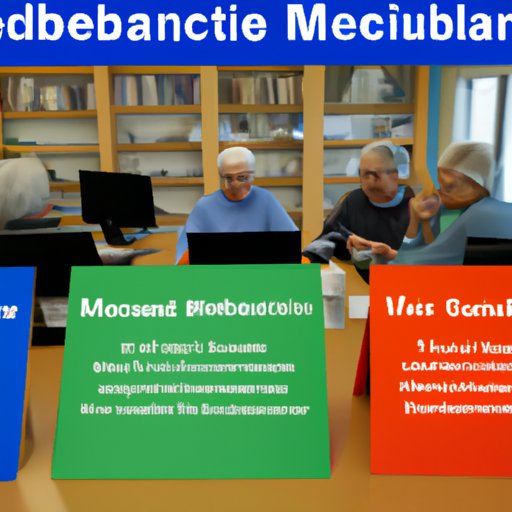Introduction
Medicare and Medicaid are two essential government health insurance programs that provide medical coverage for millions of Americans. Medicare is managed by the federal government and is available to individuals who are 65 years or older, as well as those with certain disabilities. Medicaid, on the other hand, is administered by states and is available to low-income individuals and families. While qualifying for either program can be a daunting task, it is possible to qualify for both if you meet the necessary criteria.

Understand the Eligibility Requirements for Medicare and Medicaid
In order to qualify for either program, you must first understand the eligibility requirements for each.
Who Is Eligible for Medicare?
Generally speaking, people who are 65 years or older, as well as those with certain disabilities, are eligible for Medicare. In addition, some individuals may qualify based on their spouse’s age or disability. According to the Centers for Medicare & Medicaid Services (CMS), “Most people get Medicare Part A (Hospital Insurance) and Medicare Part B (Medical Insurance) automatically when they turn 65.”1
Who Is Eligible for Medicaid?
Unlike Medicare, Medicaid eligibility is determined by income and asset levels. Each state has its own guidelines for eligibility and it is important to check with your local Medicaid office to determine if you qualify. According to the Kaiser Family Foundation, “Medicaid eligibility requirements vary from state to state, but generally, you must meet certain income and resource/asset limits to qualify for Medicaid.”2
Gather Necessary Documentation to Prove Eligibility
Once you have determined whether or not you are eligible for Medicare or Medicaid, you will need to gather the necessary documentation to prove your eligibility.
Documents Needed for Medicare
The documents needed to prove eligibility for Medicare vary depending on your individual circumstances. Generally speaking, you will need to provide proof of age or disability (if applicable), as well as proof of U.S. citizenship or lawful presence. You may also need to provide proof of income and/or assets.
Documents Needed for Medicaid
In order to qualify for Medicaid, you will need to provide proof of income and/or assets, depending on your state’s specific requirements. You may also need to provide proof of U.S. citizenship or lawful presence. It is important to contact your local Medicaid office to determine what documents are needed to apply for coverage.
Determine Your Income Level & Asset Level
Income level and asset level are two key factors that are used to determine eligibility for both Medicare and Medicaid.
Estimating Income Level
Income level is used to determine eligibility for both Medicare and Medicaid. To estimate your income level, you should add up all sources of income including wages, Social Security benefits, and any other sources of income. It is important to note that income limits vary from state to state and can change over time, so it is important to stay up to date on changes in income limits.
Evaluating Asset Level
Asset level is also used to determine eligibility for both Medicare and Medicaid. Assets include things like cash, bank accounts, stocks, bonds, and other financial investments. Different states have different rules for determining asset level, so it is important to check with your local Medicaid office to determine what counts as an asset for Medicaid eligibility purposes.
Explore State-Level Programs for Low-Income Individuals
In addition to Medicare and Medicaid, there are also state-level programs that provide health coverage for low-income individuals. These programs vary from state to state, but generally speaking, they provide coverage for individuals who do not qualify for traditional health insurance programs.
What Are State-Level Programs?
State-level programs are government-sponsored health insurance programs that provide coverage for individuals who do not qualify for traditional health insurance programs. These programs typically cover essential medical services such as doctor visits, hospital stays, and prescription drugs.
How Do I Find Out If I Am Eligible?
To find out if you are eligible for a state-level program, you should contact your local Medicaid office. They can provide you with information about eligibility requirements and how to apply for coverage.

Consider Assistance from a Qualified Professional
Navigating the complexities of Medicare and Medicaid can be a daunting task, especially for those who are unfamiliar with the process. Fortunately, there are qualified professionals who can help you understand the eligibility requirements and guide you through the application process.
What Does a Qualified Professional Do?
A qualified professional can help you understand the eligibility requirements for Medicare and Medicaid, as well as guide you through the application process. They can also provide advice on how to maximize your benefits and help you stay up to date on changes in program rules and regulations.
Where Can I Find a Qualified Professional?
You can find a qualified professional by searching online or asking friends and family for referrals. Additionally, many hospitals and clinics offer free or low-cost assistance with the Medicare and Medicaid application process.

Stay Up To Date on Changes in Program Rules and Regulations
Medicare and Medicaid are constantly changing and it is important to stay up to date on changes in program rules and regulations. The best way to stay informed is to regularly check the websites of the Centers for Medicare & Medicaid Services (CMS) and your state’s Medicaid office. Additionally, subscribing to newsletters and following social media accounts related to Medicare and Medicaid can help you stay up to date on changes in the program.
Conclusion
Qualifying for both Medicare and Medicaid can be a complex process with many eligibility requirements. Understanding the eligibility requirements, gathering the necessary documents to prove eligibility, and staying up to date on changes in program rules and regulations are all important steps in the process. Additionally, seeking assistance from a qualified professional can help make the process smoother and easier. With the right information and resources, qualifying for both Medicare and Medicaid is possible.
(Note: Is this article not meeting your expectations? Do you have knowledge or insights to share? Unlock new opportunities and expand your reach by joining our authors team. Click Registration to join us and share your expertise with our readers.)
